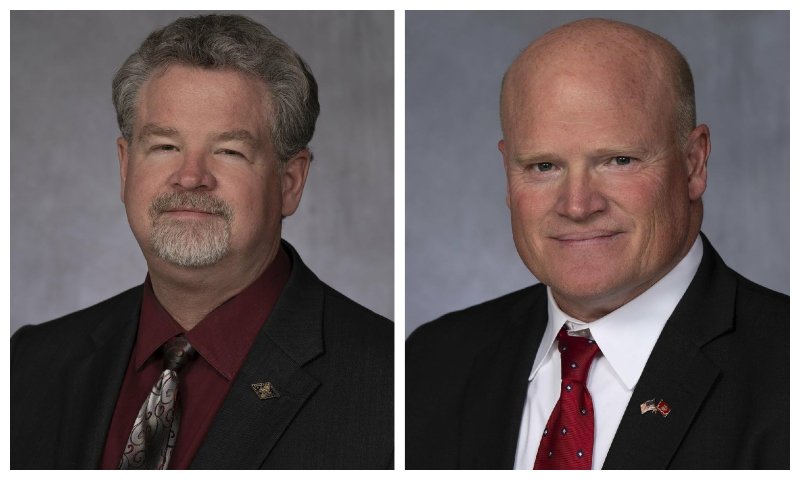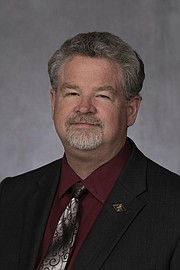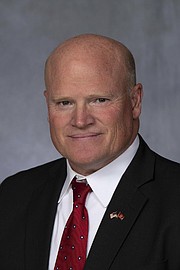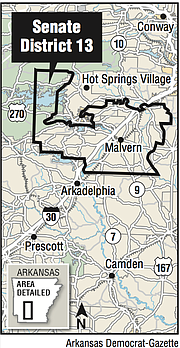Jeff Crow, a Arkansas Game and Fish Commission director, is jousting with state Sen. Alan Clark over representation of Senate District 13, their financial backing and how to fund highways and roads.
They meet in the March 3 Republican primary. Early voting starts Feb. 18.
District 13 includes Hot Spring County and part of Garland, Grant and Saline counties. The winner of the primary will take on Hot Springs Democrat Brandon Overly in the Nov. 3 general election. The term would be two years, instead of the usual four years, because of redistricting that will follow this year’s census.
Clark has served in the Senate since 2013, after ousting Sen. Mike Fletcher, D-Hot Springs, in the 2012 general election. Clark is chairman of the Senate Judiciary Committee.
Crow, 55, director of safety and emergency management at Ouachita Baptist University, resides in the New DeRoche community in Hot Spring County between Bismarck and Malvern.
Clark, 59, vice president and chief operating officer of Clark’s Building and Decorating Center, lives in Lonsdale in Garland County.
Clark said he should be reelected because he has a conservative voting record, has been effective and has done a good job of constituent service.
Crow said voters should cast their ballots for him because Senate District 13 needs to be better represented and sometimes Clark promotes his ideology over the interests of his constituents. He said Clark has raised a lot of campaign contributions, but less than 6% of those come from the district. He said the rest largely come from political action committees and lobbyists in what’s “a telling disconnect” with the district.
Through Dec. 31, Clark reported raising $134,009 in contributions, loaning his campaign $30,000 and spending $66,784, leaving a campaign treasury of $97,225. Clark has received $1,000 from Gov. Asa Hutchinson’s political action committee and $2,800 from Lt. Gov. Tim Griffin’s political action committee, according to officials for the committees.
In contrast, Crow reported raising $14,745, loaning his campaign $5,405 and spending $18,057, leaving a balance of nearly $2,093 as of Dec. 31.
As for Crow’s criticism of the campaign contributions that he has received, Clark said, “We’ll see on election day. We have done a study of his and it is mostly [from] Democrats.”
Crow said most of his campaign contributions have come from people such as public school teachers and administrators, attorneys and business people who are a good cross section of the district and know he is a solid conservative. He said he’s not checked their political affiliations.
PRIMARY VOTES
Clark said he has traditionally voted in Republican primaries, while Crow has traditionally voted in Democratic primaries.
Clark voted in the Republican primary in 1996, 2002, 2008, 2010, 2012, 2014, 2016 and 2018 and voted in the Democratic primaries in the 1998, 2000, 2004 and 2006, according to records in the secretary of state’s office.
Crow voted in Democratic primaries from 1996 to 2016 before voting Republican in 2018, according to the office’s records.
“I think that’s an important distinction,” Clark said.
“In 2016, I am choosing between[Donald] Trump, [Marco] Rubio and [Ted] Cruz and Crow is choosing between Hillary [Clinton] and Bernie Sanders and then coming along with a ‘me too’ wanting to get rid of one of the most conservative effective Republican state senators,” he said. He said he voted for Cruz, the U.S. senator from Texas, for the presidential nomination in 2016.
Crow said he historically voted in Democratic primaries in Hot Spring County because that’s where the elections for local elected officials have been decided.
“It is not a reflection of my values, apart from wanting to have a say in those local elections,” he said.
He said he voted in the Democratic primary in 2016 for a friend, Hot Spring County Judge Dennis Thornton. He didn’t cast a ballot for president in that primary, he said.
Crow graduated from Bismarck High School. He received an associate degree in criminal justice at National Park College in 1989, a bachelor’s degree in organizational management from John Brown University in 2007 and a master’s degree in public administration from Arkansas State University in 2014.
He served as the director of the Game and Fish Commission from July 1, 2016-Dec. 31, 2017, where he served five years in administrative roles. He also worked for 25 years as a state trooper and wildlife officer. He spent 25 years in the Marine Corps, including 22 years in the reserves, before retiring with the rank of sergeant major. His wife, Susanna Crow, is a special education teacher at the Cutter Morning Star High School. They have two children.
Clark graduated from Cutter Morning Star High School. He served on the Garland County Quorum Court from 1993-96. His wife, Jana Clark, works at the family’s business. They have two children.
Crow said his top priorities in the Senate are improving the education and safety for students in public schools, and training people for private industry jobs.
Clark said his top priorities will be continuing to overhaul the child welfare system, to push for improved reading and literacy, and working to improve water systems.
Each describes himself as pro-life.
Crow said he opposes abortion except to save the life of the mother.
Clark said, “I cannot justify taking a life of a child, period.”
HIGHWAYS
Crow said he would have voted for Act 416 of 2019, which will raise more money for highways and roads.
Clark voted against the measure in last year’s regular session.
Act 416 imposed a wholesale sales tax on gas and diesel fuel; increased registration fees for electric and hybrid vehicles; and reallocated state funds to raise a projected $95 million a year for the state Department of Transportation for highways and $13 million a year apiece for city and county roads.
Hot Spring, Garland and Saline counties were among the top nine counties in the state for traffic fatalities from 2013-17, based on federal figures, and part of that is a result of unsafe roads, Crow said.
“I find very few people upset with what came out of the Legislature. They are upset about the condition of the roads,” he said.
Clark said he voted against the measure because “70% to 80% of my voters said, ‘Do not raise the tax.’
“They said, ‘We recognize there is a problem with highways [and], yes, we recognize there is a problem with county roads, take it from somewhere else, etc., etc., etc., but do not raise that tax,’” he said.
Last year, Clark voted to refer to voters what is Issue 1 on the general election ballot. Issue 1 is a proposed constitutional amendment that would permanently extend the state’s 0.5% sales tax that voters approved in November 2012 for a 10-year period. State officials projected it would raise about $205 million a year for highways and about $44 million a year each for cities and counties for roads.
Crow said he intends to vote for Issue 1.
Clark said he hasn’t decided how he’ll vote on Issue 1.
BILL ON READING
Crow said Clark filed “a punitive and draconian measure” in Senate Bill 349 in the 2019 regular session that would have reduced the amount of state money that school districts receive for increasing the academic achievement of low-income students if their students’ reading abilities regress in consecutive years.
He said Clark’s initial version of the legislation unfairly blamed teachers and administrators for students’ reading problems when variables outside of the classroom also influence their reading levels.
Clark said he filed the legislation in what he called “a shot across the bow” to draw attention to the need to boost reading levels using state money flagged to help low-income students increase their academic achievement.
“It was not about punishing people. It was about trying to get people to look that if you teach them to read, that is where we can close the [achievement] gaps,” he said.
Instead, Clark said the 2019 Legislature enacted his Senate Bill 603, which is now Act 1082, that requires the state Department of Education to provide support to school districts with subpar student reading levels.
MEDICAID EXPANSION
Crow said he supports the state’s version of Medicaid expansion that provides health coverage to about 246,000 low-income Arkansans.
Clark said he opposes the program.
“Generally I support it as it is now,” Crow said. “I want to take a closer look at that, pending the court’s action on the work requirement.”
Arkansas’ work requirement for some of its Medicaid expansion participants was struck down by a federal judge in Washington, D.C., in a March ruling that Arkansas and the federal government have appealed.
Clark said he favors the work requirement.
He said he’s undecided, but leaning toward voting in the fiscal session starting in April for the state Division of Medical Sciences’ appropriation that includes the spending authority for the Medicaid expansion program for the next fiscal year.
“I think we are past the time of having that fight,” Clark said, referring to previous legislative battles over whether that appropriation would get the required three-fourths vote for approval. “I have been at the center of that fight for years.”
This calendar year, the state’s share of the cost of the program is 10% under the federal law that allows Medicaid expansion. The cost was 7% last calendar year. In fiscal 2020 that started July 1, the state’s share is projected at $165.7 million, while the federal government’s share is at $1.78 billion, according to the state Department of Finance and Administration.



